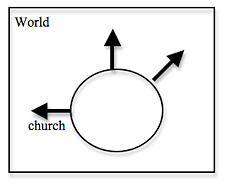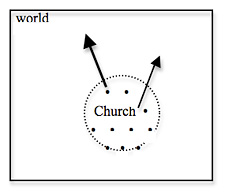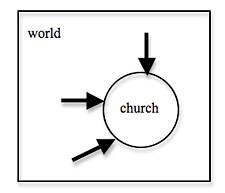 With Connect09 well and truly under way, mission is a topic that many people are discussing. One question is "who should mission?" Sometimes I hear that it is the individual, at other times the local congregation, and at other times the denomination or diocese. This question is not one that arises merely from our participation in Connect09, but one that goes to the heart of the way we see God working. The answer to the question affects the way we minister with each other, and the objectives of our congregational lives.
With Connect09 well and truly under way, mission is a topic that many people are discussing. One question is "who should mission?" Sometimes I hear that it is the individual, at other times the local congregation, and at other times the denomination or diocese. This question is not one that arises merely from our participation in Connect09, but one that goes to the heart of the way we see God working. The answer to the question affects the way we minister with each other, and the objectives of our congregational lives.
 We could see the church as primarily existing to mission; to reach out to others. It becomes involved in God's mission of saving the lost. It exists for its non-members. In diagram form, it would look something like the topmost diagram. On the other hand you could argue that it is impossible to point to a thing called the church, as the church is a gathering of individuals. This would mean that the church does not mission, but individuals mission. As a diagram, it might look my second diagram.
We could see the church as primarily existing to mission; to reach out to others. It becomes involved in God's mission of saving the lost. It exists for its non-members. In diagram form, it would look something like the topmost diagram. On the other hand you could argue that it is impossible to point to a thing called the church, as the church is a gathering of individuals. This would mean that the church does not mission, but individuals mission. As a diagram, it might look my second diagram.
 A third alternative is that, according the Ephesians, the very existence of the church, where Jew and gentile are gathered together in union with Christ, is a statement to all creatures " visible and invisible " of the character and victory of Christ. In that sense, the existence of the church does the ‘missioning’. As a diagram that would look the final diagram.
A third alternative is that, according the Ephesians, the very existence of the church, where Jew and gentile are gathered together in union with Christ, is a statement to all creatures " visible and invisible " of the character and victory of Christ. In that sense, the existence of the church does the ‘missioning’. As a diagram that would look the final diagram.
In order to make progress we need to look at what the Bible says about church and mission. I'll save the long arguments for another times and just make summary points.
A good description of the church is Titus 2:14. There Paul argues that in the dual activity of the Lord Jesus in giving himself to redeem us, and us awaiting his return to save us, he is making "a people of his very own, eager to do what is good." The lovely Biblical language which captures both the ideas of "being God's people" and "a people of his very own", is family. The church then is not a means to and end, but the goal of the mission of God. The church is a people, gathered around Christ, eager to be like Christ.
 God's mission is to bring glory to his Son, and the way he does that is by declaring and living his character, which is other person centred salvation. This means that as the Son is glorified, so others share with him in his blessings. The particular shape of this blessing is "family". So the church exists because it is the work of God.
God's mission is to bring glory to his Son, and the way he does that is by declaring and living his character, which is other person centred salvation. This means that as the Son is glorified, so others share with him in his blessings. The particular shape of this blessing is "family". So the church exists because it is the work of God.
The way the church operates, then, is more like a family than a business. A business exists to do something: make money, produce goods. But families exists to relate to each other. In families you remember birthdays because that is part of the relationship which makes us family. In families you ‘waste time’ just chatting about nothing. I love it when my daughter chats to me about the littlest things.
But because we are not yet in Heaven, both our human and our church family is dysfunctional. Despite the work of the Spirit in us, we don't always live with Christ as the centre of our lives, nor serve others as we should. Sometimes our families can be somewhat dysfunctional. Instead of Christmas being a time of building relationships, we look forward to it with trepidation, and the event leaves us more annoyed than when we started.
But in our Heavenly dysfunctional family, we are God's gift to each other to help us to be what we will one day be. For example Hebrews 3:12-13 and Hebrews 10:24-25 speak of the way we are to help each other through our difficulties . I suppose it would be like being in the famous Chappell cricketing family. Three brothers who all played for Australia, and despite the competitiveness they must have helped each other be better sportsmen. As a result of the family, they were all assisted. Likewise, the church grows "up' as a result of being the family - each person becoming more like Christ.
But does the family, the church, the congregation have any face toward the world? Congregation family members, as a result of being in the family and by the work of God's Spirit become more like Christ. This results in blessing to the world as they are drawn to God. The family also networks with each other, so that they can help each other. Different members contribute different things. Just as in 1 Corinthians 3, where Paul planted, Apollos watered, but God gave the growth.
Archie Poulos is a lecturer at Moore Theological College and heads the Moore College Missions Committee






















